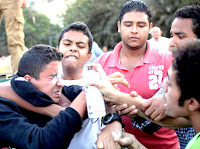Time Post-traumatic stress disorder (PTSD) experts Dr. Steven Southwick and Dr. Dennis Charney investigate the power of resilience in their new book, Resilience: The Science of Mastering Life’s Greatest Challenges.
Recovering from a natural disaster takes physical and psychological strength, and as those attempting to rebuild their lives in the aftermath of Hurricane Sandy are learning, it doesn’t hurt to have help. To better understand which tools help us to bounce back from trauma and cope with stress, Southwick, a psychiatry professor at Yale University, and Charney, a psychiatry professor at Mount Sinai Hospital, studied Navy SEALs, rape survivors, prisoners of war and others who overcame highly stressful situations with only minimal mental hardship. It turns out that these survivors share critical skills that can support anyone, even those who haven’t been professionally trained or naturally endowed with resilience, to better combat trauma. [...]
Recovering from a natural disaster takes physical and psychological strength, and as those attempting to rebuild their lives in the aftermath of Hurricane Sandy are learning, it doesn’t hurt to have help. To better understand which tools help us to bounce back from trauma and cope with stress, Southwick, a psychiatry professor at Yale University, and Charney, a psychiatry professor at Mount Sinai Hospital, studied Navy SEALs, rape survivors, prisoners of war and others who overcame highly stressful situations with only minimal mental hardship. It turns out that these survivors share critical skills that can support anyone, even those who haven’t been professionally trained or naturally endowed with resilience, to better combat trauma. [...]
Another surprising factor involves being true to your own morals…
DC: It’s to embrace a personal moral compass, develop a set of beliefs that very few things can shatter. That’s really important. It was very important to the POWs. They were being tortured, but their own set of beliefs about what was right [could] not be touched
DC: It’s to embrace a personal moral compass, develop a set of beliefs that very few things can shatter. That’s really important. It was very important to the POWs. They were being tortured, but their own set of beliefs about what was right [could] not be touched
SS: I don’t think I was expecting that to be as
powerful as it was. [But] one of the things often happens in highly
stressful situations, particularly if someone else is injured or killed
is that there’s a tremendous tendency to develop survivor guilt.
We’ve interviewed some medal-of-honor winners. They are the bravest
of the brave. There are only some 200 of them in the U.S. No one could
do more. But the few we interviewed in depth, they have survivor guilt.
They felt that they should have done more. [So] that’s going to happen
no matter what you do and you don’t want to add to that if you violate
some principle you think is important.







